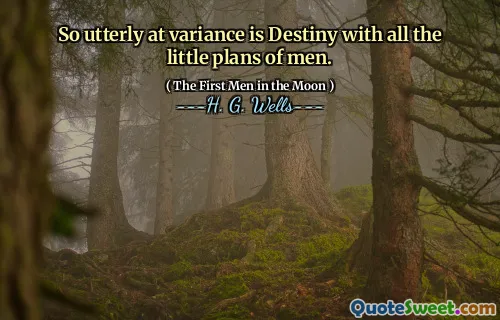
He sighed and looked about him. 'This is no world for men,' he said. 'And yet in a way...it appeals.
H.G. Wells' "The First Men in the Moon" explores the duality of human experience in an unfamiliar world. The protagonist's sigh reflects a deep contemplation about the harsh realities of life, suggesting that the world they inhabit poses significant challenges for humanity. Despite these difficulties, there is an underlying allure that draws them in, hinting at the complexity of human emotions toward exploration and the unknown. This statement encapsulates the struggle between despair and curiosity, as the character acknowledges the unwelcoming nature of their surroundings while simultaneously feeling a sense of fascination. It highlights the paradox of the human condition, where the desire for adventure can coexist with the recognition of adversity. Through this lens, Wells invites readers to consider the richness of exploration, both external and internal, and the transformative power of engaging with the unknown.
H.G. Wells' "The First Men in the Moon" explores the duality of human experience in an unfamiliar world. The protagonist's sigh reflects a deep contemplation about the harsh realities of life, suggesting that the world they inhabit poses significant challenges for humanity. Despite these difficulties, there is an underlying allure that draws them in, hinting at the complexity of human emotions toward exploration and the unknown.
This statement encapsulates the struggle between despair and curiosity, as the character acknowledges the unwelcoming nature of their surroundings while simultaneously feeling a sense of fascination. It highlights the paradox of the human condition, where the desire for adventure can coexist with the recognition of adversity. Through this lens, Wells invites readers to consider the richness of exploration, both external and internal, and the transformative power of engaging with the unknown.











